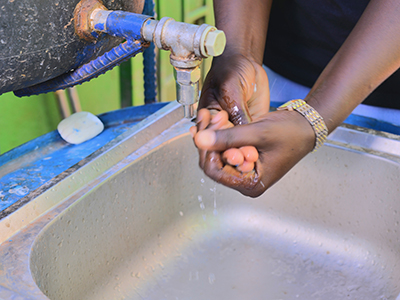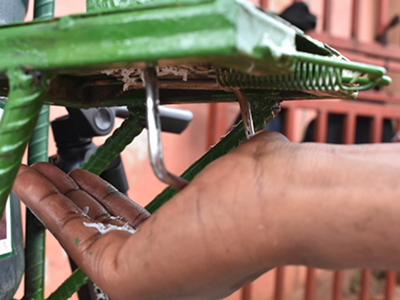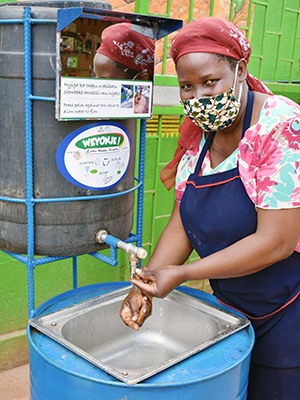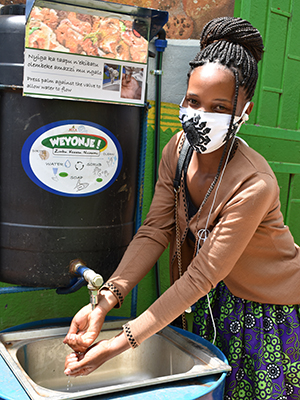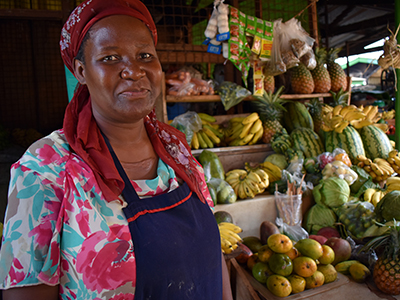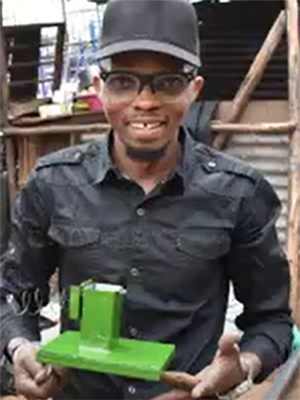More than 3 billion people worldwide don’t have access to soap and water, one of the simplest ways to stop the spread of COVID-19 as well as other diseases.
That statistic is one of the drivers behind an Engineers Without Borders USA (EWB-USA) pilot project in Kampala, the capital of Uganda. Since May 2020, the nonprofit has designed, built, and managed the installation of 200 handwashing stations in the city’s public markets, taxi stands, and train stations.
“If we’re going to control COVID-19, we have to make hand hygiene accessible to all,” says Zoe Pacciani, director of EWB-USA’s Uganda country office.
Soap was the team’s biggest stumbling block in designing the stations. A bar that is handled by hundreds of people a day creates public health issues. Liquid soap is safer, but pricey and hard to find in Uganda.
To solve the problem, the EWB-USA team partnered with the Uganda branch of Response Innovation Lab (RIL), a nonprofit that applies creative thinking to complex, on-the-ground humanitarian problems. RIL rallied the country’s inventors to come up with a lockable device that could easily and safely dispense small portions from a bar of soap.
The team received 31 ideas within 10 days. “It was a very tough competition,” says Charlene Cabot, manager of RIL’s Uganda operations. “The teams were required to build prototypes or submit videos of their inventions in action.”
The winning design was submitted by Ali Kabona, a 25-year student pursuing a telecommunications engineering degree at Uganda’s Makerere University. “I wanted to be an inventor when I was a child,” says Ali. “When I saw the challenge, I thought this was my chance to do something to help the people in my country.”
Ali’s initial design called for embedding a “soap shaver” inside a dispenser operated with a foot pedal. However, after building a prototype and testing it in a public market, he learned that users found the foot pedal too slow. He reconsidered his design and came up with a compact metal structure that is welded onto the handwashing station. This version has a lockable compartment for the soap bar and uses the embedded shaver to create soap flakes that easily fall into the user’s hands after pulling a simple lever.
The EWB-USA team worked with Ali to manufacture 200 of the soap dispensers for use with the public handwashing stations. One of the first installations was at Ntinda Market, where farmers from rural areas sell fruits and vegetables to Kampala residents. “Local markets play a role in linking urban and rural economies,” says Zoe. “It is important to protect and enhance these markets and the people who depend on them.”
The vendors at Ntinda value the new hand-washing stations. “We are the first to have this type of handwashing station,” says produce vendor Tabitha Kawala. “It is so good. We are so proud.” She and other vendors are quick to show shoppers how to use the station to make sure the market’s 500+ daily visitors can access the life-saving soap and water.
The fast-track project was funded by Bechtel, which has underwritten 70 EWB-USA projects since 2011. In addition, the company’s engineers have volunteered their expertise to a diverse mix of projects, including community latrines in Ethiopia, clean water in Uganda, and a biogas plant that brings clean fuel for cooking to a village in India.


